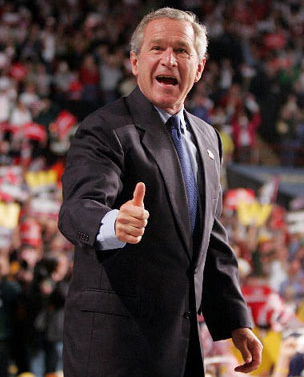The Bush Factor
 “How much of an impact will President Bush have on voters’ decisions next year?”
“How much of an impact will President Bush have on voters’ decisions next year?”
It’s an interesting question. Respected political analyst Stuart Rothenberg takes a thorough review of the historical record and demonstrates, quite convincingly, that the experts haven’t the foggiest idea.
Ultimately, there have simply been too few elections that didn’t feature either an incumbent president or a sitting vice president. The subset of those where an unpopular president was in office as a whipping boy for the opposition party is tiny, indeed: The 1952 contest pitting Adlai Stevenson against Dwight Eisenhower. That race obviously doesn’t shed much light since Eisenhower was a uniquely popular, transcendent figure.
One can’t leave a column at “I haven’t a clue,” so Rothenberg draws a tepid conclusion:
In midterms, many Americans vote retrospectively. That is, they base their decisions on past performance. In presidential elections, they tend to look forward, to evaluate the nominees on the basis of how they will perform in office.
But is it reasonable to believe that voters completely disregard past performance — a party’s past performance — when an unpopular president leaves office? Probably not.
After all, Democrats have plenty of tape of Bush making promises that were not kept and asserting truths that turned out not to be true. And they’ll be running against a party that has been defined for the past few years by its leader, the president of the United States. That means the Republican nominee for president will inevitably be the candidate of continuity rather than dramatic change, no matter how passionately he delivers a message of change.
It’s also true, however, that once the GOP has a presidential nominee, he will start to redefine the public’s image of the Republican Party. George W. Bush will seem less relevant, less important. But he will never disappear. That doesn’t doom the Republican nominee, but it puts him in a hole even before the race has begun.
That has the ring of truth to it. Certainly, a Hillary Clinton or Barack Obama will have an easier time of making the case that they represent a complete break from the Bush administration.
Those running against the current policies would seem to have the advantage, given Bush’s woeful approval ratings. Then again, it may be that the voters actually want the basic outlines of the Bush policy, simply executed more competently and with a more articulate spokesman. If the fictional Jack Bauer were running, after all, he’d probably win.
Further, a platform of “the country has gone to hell in a handcart” is necessarily negative and the candidate offering the more optimistic message almost always wins. The question for the Republicans is whether they have a candidate who can communicate that theme effectively.
I’ve heard the Rudy is thinking of buffing up.
Truman and Johnson have some striking similarities to the current situation.
Both declined to run (Bush didn’t decline, but won’t run for other reasons).
All three were involved in war that had controversy as to how they started, questions being raised as to how necessary the war was and questions on the competency of how the war has been waged.
For Truman and Johnson, the election went to the other party. But the election also went to the guy promising to fix the problems and win the war, not to the guy saying “run away”.
Bush will remain extraordinarily relevant, if the dems have anything to say in the matter.
The leading Republican contenders have already wrapped themselves in the neocon flag- McCain’s ‘Bomb, Bomb, Bomb Iran’ will be played on an endless loop; Romney putting legal advisors ahead of the constitution and his desire to ‘double GITMO’ likewise, and Giuliani with his torture boast and his rat’s nest of looney advisors is the gift that keeps on giving. Every dem spot will end on the words ‘Out Bushes Bush’.
“But the election also went to the guy promising to fix the problems and win the war”
Not really. Nixon and Ike certainly promised to fix the problem, but neither claimed that they would win the war. Nixon promised “peace with honor”, which was widely understood to mean running away in slow motion while claiming not to.
I admit that I wasn’t following presidential elections all that closely (especially since I wasn’t even a gleam in my Dad’s eye for Ike), but I think both gave a clear indication that they were going to win the war on some terms.
As for Ike, read his “I will go to Korea” speech.
To say that Ike was not seeking to win the war in Korea on terms favorable to the US is to re-write history.
In reading the speech, I see a bunch of lines that would make for good material in 2008. Contrast the democrat’s votes to go to war, then to run away with the improving conditions is likely to be a bit of a problem for the left winning in 2008.